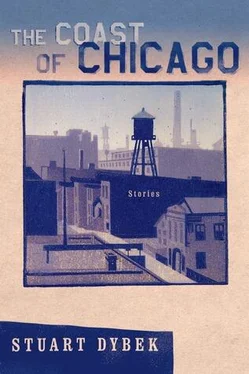Stuart Dybek - The Coast of Chicago - Stories
Здесь есть возможность читать онлайн «Stuart Dybek - The Coast of Chicago - Stories» весь текст электронной книги совершенно бесплатно (целиком полную версию без сокращений). В некоторых случаях можно слушать аудио, скачать через торрент в формате fb2 и присутствует краткое содержание. Год выпуска: 2004, Издательство: Picador, Жанр: Современная проза, на английском языке. Описание произведения, (предисловие) а так же отзывы посетителей доступны на портале библиотеки ЛибКат.
- Название:The Coast of Chicago: Stories
- Автор:
- Издательство:Picador
- Жанр:
- Год:2004
- ISBN:нет данных
- Рейтинг книги:5 / 5. Голосов: 1
-
Избранное:Добавить в избранное
- Отзывы:
-
Ваша оценка:
- 100
- 1
- 2
- 3
- 4
- 5
The Coast of Chicago: Stories: краткое содержание, описание и аннотация
Предлагаем к чтению аннотацию, описание, краткое содержание или предисловие (зависит от того, что написал сам автор книги «The Coast of Chicago: Stories»). Если вы не нашли необходимую информацию о книге — напишите в комментариях, мы постараемся отыскать её.
is a masterpiece from one of America’s most highly regarded writers.
The Coast of Chicago: Stories — читать онлайн бесплатно полную книгу (весь текст) целиком
Ниже представлен текст книги, разбитый по страницам. Система сохранения места последней прочитанной страницы, позволяет с удобством читать онлайн бесплатно книгу «The Coast of Chicago: Stories», без необходимости каждый раз заново искать на чём Вы остановились. Поставьте закладку, и сможете в любой момент перейти на страницу, на которой закончили чтение.
Интервал:
Закладка:
It was only after Marcy began playing late at night that I remembered my mother crying. In my room, with the door shut against the steam, it seemed she was playing for me alone. I would wake already listening and gradually realize that the music had been going on while I slept, and that I had been shaping my dreams to it. She played only nocturnes those last weeks of winter. Sometimes they seemed to carry over the roofs, but mostly she played so softly that only the air shaft made it possible to hear. I would sit huddled in my covers beside the window listening, looking out at the white dunes on Freddy’s roof. The soldier was long gone, his helmet rusted off. Smoke blew unhooded; black flakes with sparking edges wafted out like burning snow. Soot and music and white gusts off the crests buffeted the pane. Even when the icicles began to leak and the streets to turn to brown rivers of slush, the blizzard in the air shaft continued.
Marcy disappeared during the first break in the weather. She left a note that read: “Ma, don’t worry.”
“That’s all,” Mrs. Kubiac said, unfolding it for my mother to see. “Not even ‘love,’ not even her name signed. The whole time I kept telling her ‘do something,’ she sits playing the piano, and now she does something, when it’s too late, unless she goes to some butcher. Ev, what should I do?”
My mother helped Mrs. Kubiac call the hospitals. Each day they called the morgue. After a week, Mrs. Kubiac called the police, and when they couldn’t find Marcy, any more than they had been able to find Dzia-Dzia, Mrs. Kubiac began to call people in New York — teachers, old roommates, landlords. She used our phone. “Take it off the rent,” she said. Finally, Mrs. Kubiac went to New York herself to search.
When she came back from New York she seemed changed, as if she’d grown too tired to be frantic. Her hair was a different shade of gray so that now you’d never know it had once been blonde. There was a stoop to her shoulders as she descended the stairs on the way to novenas. She no longer came downstairs for tea and long talks. She spent much of her time in church, indistinguishable among the other women from the old country, regulars at the morning requiem mass, wearing babushkas and dressed in black like a sodality of widows, droning endless mournful litanies before the side altar of the Black Virgin of Czestochowa.
By the time a letter from Marcy finally came, explaining that the entire time she had been living on the South Side in a Negro neighborhood near the university, and that she had a son whom she’d named Tatum Kubiac—“Tatum” after a famous jazz pianist — it seemed to make little difference. Mrs. Kubiac visited once but didn’t go back. People had already learned to glance away from her when certain subjects were mentioned — daughters, grandchildren, music. She had learned to glance away from herself. After she visited Marcy she tried to sell the piano, but the movers couldn’t figure how to get it downstairs, nor how anyone had ever managed to move it in.
It took time for the music to fade. I kept catching wisps of it in the air shaft, behind walls and ceilings, under bathwater. Echoes traveled the pipes and wallpapered chutes, the bricked-up flues and dark hallways. Mrs. Kubiac’s building seemed riddled with its secret passageways. And, when the music finally disappeared, its channels remained, conveying silence. Not an ordinary silence of absence and emptiness, but a pure silence beyond daydream and memory, as intense as the music it replaced, which, like music, had the power to change whoever listened. It hushed the close-quartered racket of the old building. It had always been there behind the creaks and drafts and slamming doors, behind the staticky radios, and the flushings and footsteps and crackling fat, behind the wails of vacuums and kettles and babies, and the voices with their scraps of conversation and arguments and laughter floating out of flats where people locked themselves in with all that was private. Even after I no longer missed her, I could still hear the silence left behind.
Lights
In summer, waiting for night, we’d pose against the afterglow on corners, watching traffic cruise through the neighborhood. Sometimes, a car would go by without its headlights on and we’d all yell, “Lights!”
“Lights!” we’d keep yelling until the beams flashed on. It was usually immediate — the driver honking back thanks, or flinching embarrassed behind the steering wheel, or gunning past, and we’d see his red taillights blink on.
But there were times — who knows why? — when drunk or high, stubborn, or simply lost in that glide to somewhere else, the driver just kept driving in the dark, and all down the block we’d hear yelling from doorways and storefronts, front steps, and other corners, voices winking on like fireflies: “Lights! Your lights ! Hey, lights!”
Death of the Right Fielder
After too many balls went out and never came back we went out to check. It was a long walk — he always played deep. Finally we saw him, from the distance resembling the towel we sometimes threw down for second base.
It was hard to tell how long he’d been lying there, sprawled on his face. Had he been playing infield, his presence, or lack of it, would, of course, have been noticed immediately. The infield demands communication — the constant, reassuring chatter of team play. But he was remote, clearly an outfielder (the temptation is to say out sider ). The infield is for wisecrackers, pepper-pots, gum-poppers; the outfield is for loners, onlookers, brooders who would rather study clover and swat gnats than holler. People could pretty much be divided between infielders and outfielders. Not that one always has a choice. He didn’t necessarily choose right field so much as accept it.
There were several theories as to what killed him. From the start the most popular was that he’d been shot. Perhaps from a passing car, possibly by that gang calling themselves the Jokers, who played sixteen-inch softball on the concrete diamond with painted bases in the center of the housing project, or by the Latin Lords, who didn’t play sports, period. Or maybe some pervert with a telescopic sight from a bedroom window, or a mad sniper from a water tower, or a terrorist with a silencer from the expressway overpass, or maybe it was an accident, a stray slug from a robbery, or shoot-out, or assassination attempt miles away.
No matter who pulled the trigger it seemed more plausible to ascribe his death to a bullet than to natural causes like, say, a heart attack. Young deaths are never natural; they’re all violent. Not that kids don’t die of heart attacks. But he never seemed the type. Sure, he was quiet, but not the quiet of someone always listening for the heart murmur his family repeatedly warned him about since he was old enough to play. Nor could it have been leukemia. He wasn’t a talented enough athlete to die of that. He’d have been playing center, not right, if leukemia was going to get him.
The shooting theory was better, even though there wasn’t a mark on him. Couldn’t it have been, as some argued, a high-powered bullet traveling with such velocity that its hole fuses behind it? Still, not everyone was satisfied. Other theories were formulated, rumors became legends over the years: he’d had an allergic reaction to a bee sting, been struck by a single bolt of lightning from a freak, instantaneous electrical storm, ingested too strong a dose of insecticide from the grass blades he chewed on, sonic waves, radiation, pollution, etc. And a few of us liked to think it was simply that chasing a sinking liner, diving to make a shoestring catch, he broke his neck.
There was a ball in the webbing of his mitt when we turned him over. His mitt had been pinned under his body and was coated with an almost luminescent gray film. There was the same gray on his black, high-top gym shoes, as if he’d been running through lime, and along the bill of his baseball cap — the blue felt one with the red C which he always denied stood for the Chicago Cubs. He may have been a loner, but he didn’t want to be identified with a loser. He lacked the sense of humor for that, lacked the perverse pride that sticking for losers season after season breeds, and the love. He was just an ordinary guy, 250 at the plate, and we stood above him not knowing what to do next. By then the guys from the other outfield positions had trotted over. Someone, the shortstop probably, suggested team prayer. But no one could think of a team prayer. So we all just stood there silently bowing our heads, pretending to pray while the shadows moved darkly across the outfield grass. After a while the entire diamond was swallowed and the field lights came on.
Читать дальшеИнтервал:
Закладка:
Похожие книги на «The Coast of Chicago: Stories»
Представляем Вашему вниманию похожие книги на «The Coast of Chicago: Stories» списком для выбора. Мы отобрали схожую по названию и смыслу литературу в надежде предоставить читателям больше вариантов отыскать новые, интересные, ещё непрочитанные произведения.
Обсуждение, отзывы о книге «The Coast of Chicago: Stories» и просто собственные мнения читателей. Оставьте ваши комментарии, напишите, что Вы думаете о произведении, его смысле или главных героях. Укажите что конкретно понравилось, а что нет, и почему Вы так считаете.












